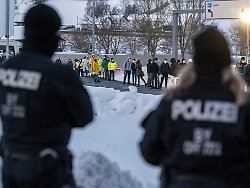Monday, January 25, 2021
Söder stays tough
Czech Republic angry about new mandatory testing
The Czech government is upset about the new compulsory testing for commuters. But Prime Minister Babis fails to change the mind of the Bavarian Prime Minister. Meanwhile, cross-border commuters have to wait hours for their throat swabs and feel harassed.
The stricter entry rules for commuters from the Czech Republic have led to traffic obstructions in some places on the border with Germany. The federal government had declared the neighboring country to be a high-risk corona area. Daily cross-border commuters have to present a new negative corona test every 48 hours when entering Bavaria, and twice a week in Saxony. On the first working day since the tightening, a three-kilometer-long backwater formed in front of the Folmova-Furth border crossing into Wald. The German police spoke of around 400 vehicles in the morning. A line of cars several hundred meters long formed in front of a mobile test station on the Czech side before the transition to Schirnding. According to the authorities, the waiting time for a throat swab was several hours. The police regulated the traffic.
It is estimated that between 35,000 and 60,000 Czechs regularly travel to Germany to work. The Czech Prime Minister Andrej Babis phoned the Bavarian Prime Minister Markus Söder to ask for relief. It was a constructive exchange, said a Bavarian government spokesman afterwards. But Söder had expressed that the Free State insisted on compulsory testing when entering Bavaria. Nevertheless, one is confident that the situation at the border will normalize.
"This is discrimination," said a commuter in Zelezna Ruda (Eisenstein market) of the CTK agency. Hundreds of German colleagues at work were not tested, but he had to wait two and a half hours in line for the throat swab. "If it were at least only twice a week, but there is no time to manage it," said a woman who works in a metalworking company in Grafenau.
Frustration among the commuters
The life of cross-border workers and their families is made more difficult, said Jan Triska from the Czech Commuter Association (APCR). Those who can afford it will look for a new job in the Czech Republic. For many, however, it is about their existence. "The uncertainty is huge," said Triska. Many are of the opinion that the tightening is politically motivated. "The politicians in Germany are blaming the unfavorable corona situation on the commuters, on the Czechs, even if there is no relevant data," said the representative of the interest group.
Despite the critical Corona situation in many EU countries, a little more than half of Germans support the borders in the EU, which are initially left open. In a survey by the opinion research institute YouGov, 53 percent of those questioned welcomed the commitment of the EU states to keep borders open for commuters. 29 percent rejected this, almost one in five gave no answer. 55 percent of West Germans in the survey spoke out in favor of open borders somewhat more often than people from East Germany (50 percent).
. (tagsToTranslate) Politics (t) Czech Republic (t) Corona measures (t) Entry ban (t) Markus Söder (t) Andrej Babis
